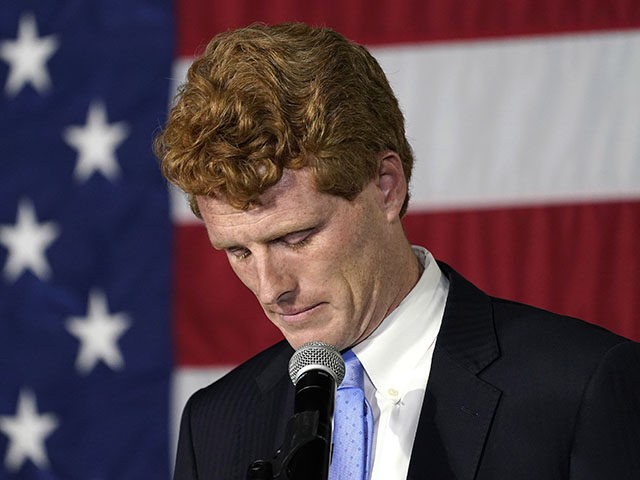Rep. Joe Kennedy III (D-MA) suffered a historic loss Tuesday against incumbent Sen. Ed Markey (D-MA) in their highly anticipated Senate primary race, marking the first loss for the family in a Massachusetts election since John F. Kennedy won his congressional race in 1946.
Kennedy called Markey to concede around 10:00 p.m., according to the Boston Globe, and the Associated Press projected Markey’s victory at 10:30 p.m. As of the time of this writing, Markey led the race 54.1 percent to 45.9 percent with 908,022 votes counted and 73 percent of precincts reported.
“Good elections often get heated,” Kennedy said in his concession speech. “Obviously these results are not the ones we were hoping for, but to everyone who fought with us … I am so proud of what we accomplished”:
Grateful. https://t.co/SwW9VmTcQj
— Joe Kennedy III (@joekennedy) September 2, 2020
Kennedy, 39, has been widely regarded as a rising star among congressional Democrats. He was praised by House Speaker Nancy Pelosi (D-CA) for his aggressive campaigning in 2018 to flip the House to Democrat majority and in that same year was handpicked by the speaker to deliver the Democrat response to President Donald Trump’s first State of the Union address. The young congressman, true to form, entered the race last September with a dramatic double-digit lead over Markey.
In the final months leading up to the race, however, Kennedy’s frontrunner status crumbled as he faced the pressing question, with no clear answer, of why he was challenging Markey, an incumbent who is well-liked among the Bay State’s widely progressive voter demographic.
Aside from an inability to rationalize his Senate bid, his campaign had other missteps, releasing an ad in one instance that knocked Markey for his lack of presence in towns that actually no longer existed, as they had been flooded decades prior by a reservoir. Another of his ads seemingly backfired after it balked at the “establishment” while failing to recognize the irony that Kennedy is a scion of perhaps the most established political family in American history.
Kennedy’s father was a U.S. representative. His grandfather, Bobby Kennedy, served as U.S. attorney general and U.S. senator in New York, and later was assassinated while running for president. His great uncles include President John F. Kennedy, who was also assassinated, and Sen. Ted Kennedy. His great-great-grandfather was a mayor of Boston.
Despite his family’s prolific influence in politics and the initially promising outlook of his own campaign, Kennedy will now be out of office altogether come January as he gave up his Fourth District seat in the House in his quest for Senate.
He is the first Kennedy in over 30 races, since John F. Kennedy won his congressional election in 1946, to ever lose a primary or general election in Massachusetts.
Markey, having anticipated a contentious race with the congressman, secured a wealth of endorsements early on, including from the Bay State’s senior Sen. Elizabeth Warren (D) in February 2019, and then from other big names like Senate Minority Leader Chuck Schumer (D-NY), “Squad” leader Rep. Alexandria Ocasio-Cortez (D-NY), and billionaire climate change activist Tom Steyer.
Markey especially promoted his endorsement from Ocasio-Cortez, who has typically gunned for young insurgent candidates but took on protecting the progressive 74-year-old incumbent for this particular race. One of Markey’s campaign ads in July featured the democratic socialist for its full 30 seconds as she gushed over Markey being an original cosponsor of Medicare for All, her coauthor on the failed Green New Deal, and a “stalwart champion for racial justice.”
Kennedy, although coming up shorter on the endorsement front, picked up less than two weeks ago the uncharacteristic support of the House’s highest-ranking member, Pelosi, who apparently sought to save his scrambling campaign even though the speaker has historically shunned Democrat challenges to incumbents.
In the day following Pelosi’s endorsement, the Kennedy campaign raised $100,000; however, according to Politico, Markey rallied together a “potent small-dollar fundraising operation” and raised “four times that amount — $400,000 — in the 24 hours after Pelosi weighed in, much of it from progressives frustrated with Pelosi’s decision to intervene.”
The heated primary race was indeed expensive; the Federal Election Commission filings through August 12 show the Kennedy campaign spent $11.6 million and the Markey campaign spent $8.6 million. Additionally, per a Boston Globe assessment, super PACs shelled out a combined $7.9 million on the two candidates.
As Markey continues on to the general election, he will face Kevin O’Connor, an attorney from Dover and automatic underdog, being the Republican candidate in the solidly blue state.

COMMENTS
Please let us know if you're having issues with commenting.